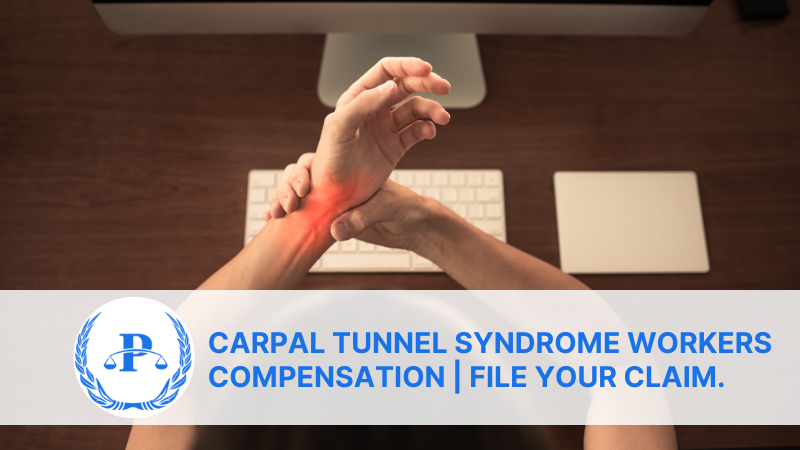Carpal Tunnel Syndrome workers compensation is a common Repetitive stress injury, especially in repetitive hand and wrist movements. This sickness can cause significant pain, numbness, and weakness, hurting your job and life. Carpal tunnel syndrome may be work-related. A workers’ compensation claim can help you seek medical care and salary replacement. This article can help you file a carpal tunnel syndrome workers’ compensation claim and get paid.
Carpal Tunnel Syndrome: Understanding
Carpal tunnel syndrome occurs when the wrist squeezes the median nerve, which runs from forearm to palm. Compression might result from vibrating instruments, repetitive motions, or awkward hand positions. Common CTS symptoms:
- Fingers, palms, and wrists hurt, tingle, or burn.
- Numb thumb, index, and middle fingers.
- Lack of grip or fine motor abilities.
What is the Carpal Tunnel Syndrome Workers Compensation Claim Procedure?
Carpal Tunnel Syndrome Workers compensation, a state-mandated insurance scheme, covers workplace injuries and illnesses. The Carpal Tunnel Syndrome workers compensation claim process compensates injured workers for medical bills, missed earnings, and other costs. Most workers must follow a generic carpal tunnel syndrome workers compensation claim process, which varies by state. The standard workers’ compensation claim process is outlined below:
- Get Medical Help: Visit a doctor for carpal tunnel syndrome symptoms. Medical practitioners will diagnose your issue with physical, nerve conduction, or EMG tests. Tell your doctor about work-related symptoms for your medical records.
- Inform Your Employer of Your Injury: Notify your employer about carpal tunnel syndrome promptly. Each state has work-related injury reporting deadlines; skipping them may affect your claim. Inform your employer of your symptoms, diagnosis, and job injuries. Record this notification.
- Collect Proof: You must prove your claim. Gather your diagnosis, treatment plan, and test results should be recorded. Tell your doctor your carpal tunnel syndrome is work-related. Gather documents of your occupations and obligations that may have caused your injuries.
- Submit Claims: You must submit claim papers and supporting paperwork to your employer’s workers’ compensation insurer. Your employer reports your claim to your insurance. Record all documents.
- Keep doctor visits: Attend all doctor appointments and follow your therapy. A doctor chosen by the insurance company may do an IME. Cooperate with these exams, however the IME doctor may disagree with your treating doctor.
- Consult an insurance adjuster: Insurance will dispatch a claim adjuster. Inform the adjuster and provide the needed papers. Keep your statements honest and avoid exaggerating symptoms.
Navigating Challenges and Denials
Several factors can lead to the denial of a workers’ compensation claim. Some of the most common reasons include:
- Knowing Denials: Some carpal tunnel syndrome workers’ comp claims are denied. Common reasons for denial include Insufficient proof of work-related damage.The insurance company may blame pre-existing conditions for your symptoms. Untimely injury reporting.
- Appealing Denial: Appeals are possible if your claim is denied. Give the insurance company more evidence to rethink. If reconsideration fails, appeal to your state’s workers’ compensation board or commission. Administrative law judge hearings are common. Consider a workers’ comp attorney for appeals. Your attorney can gather evidence, prepare your case, and advocate.
- Representation Matters: Due to the complexity of carpal tunnel syndrome workers compensation claims, legal aid may improve your chances. A lawyer will explain carpal tunnel syndrome workers compensation rights and duties. They Help gather and arrange proof for your claim. They Receive a fair insurance carpal tunnel workers’ compensation average settlement for medical bills, missed wages, and other damages. I will effectively convey your case in hearings and appeals.
Conclusion
Carpal tunnel syndrome workers’ compensation claims require thorough documentation, early reporting, and procedural expertise. This information and legal guidance can help you navigate the workers’ compensation system and collect your benefits. Early planning and effort are needed for successful claims.
If you suspect work-related carpal tunnel syndrome, see a doctor and alert your employer. These steps help boost your Carpal Tunnel compensation claim quickly.
An experienced Work injury attorney can advise and assist. They can advise and defend you during pain and suffering claims. Getting your due can help you recover and return to work with confidence.
At the Law Office of Spiro K Pistiolas, A Workers’ Compensation Attorney, we represent the best Workplace injury attorneys who have handled a wide range of cases. Contact us today at (844) 414-1768 for a free consultation!












